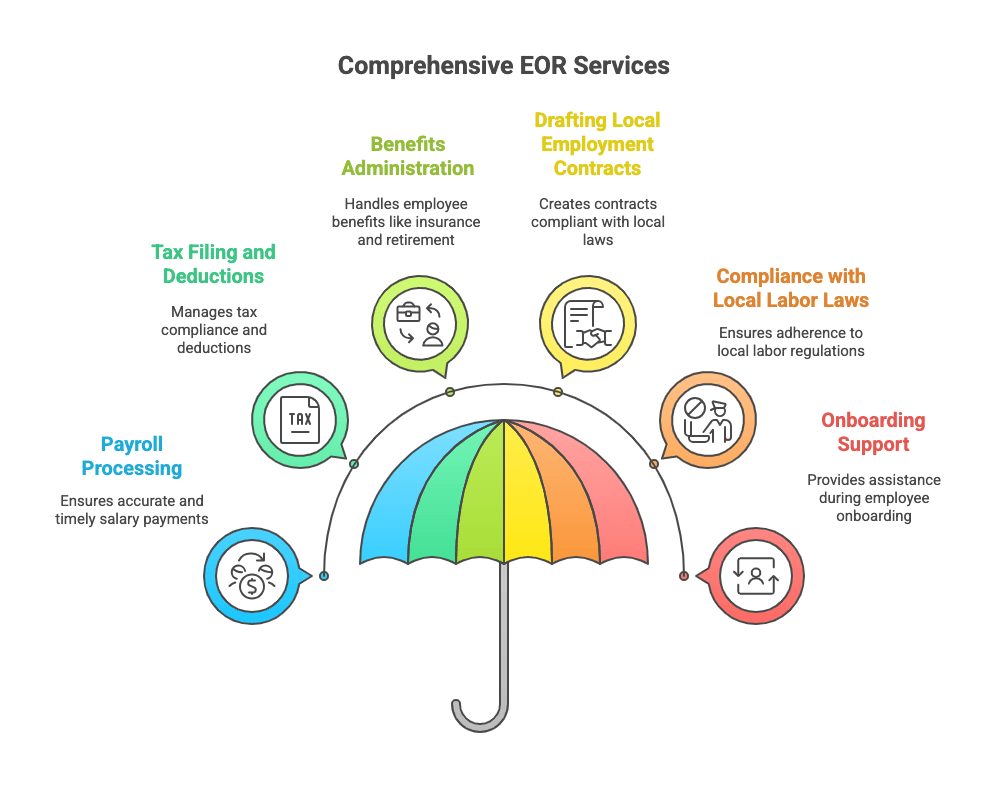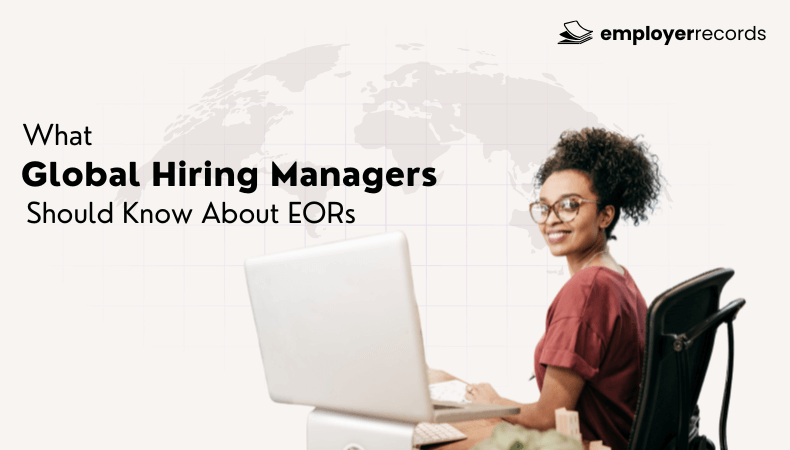Expanding a business into new countries is exciting, but it also comes with a mountain of legal and administrative challenges. From payroll and tax laws to hiring practices that vary wildly across borders, the complexity can quickly overwhelm even seasoned teams.
That’s where an Employer of Record (EOR) comes in.
Think of an EOR as your behind-the-scenes partner for global hiring. They handle the legal employment side of things, so you don’t have to open a local entity or become an expert in foreign labor laws.
Instead, you can focus on growing your business, while the EOR ensures you stay compliant and your international team is fully supported.
This arrangement allows the client company to focus on its core operations while ensuring that employment practices in the new market are compliant and efficient.
Utilizing an EOR can significantly reduce the time and resources required for international expansion, enabling businesses to tap into global talent pools swiftly and with reduced risk.
In essence, an EOR simplifies the complexities of global workforce management, making it an essential tool for companies pursuing international growth.
What Is an Employer of Record (EOR)?
An Employer of Record is a third-party service that hires workers for your company, legally speaking. You’re still in charge of their tasks and projects, but the EOR handles all the paperwork and compliance stuff.
What Does an EOR Do?
Here’s what an EOR usually handles:
- Payroll: EOR can manage payroll with the right deductions, bonuses, and taxes taken care of.
- Tax Compliance: Keeps track of tax laws and files everything correctly to help you avoid fines.
- Benefits: Offers things like health insurance and retirement plans that match local expectations.
- Contracts: Prepares legally correct employment contracts.
- Labor Law Compliance: Stays updated on local employment rules, like work hours, minimum wage, and how to handle terminations.
This arrangement allows companies to hire employees in regions where they may not have a legal entity, facilitating global expansion without the need to establish a local presence.

For instance, Deel Worldwide offers EOR services that help businesses engage talent in over 150 countries, providing tailored solutions for seamless business expansion.
Similarly, Rippling provides a comprehensive workforce management platform that includes EOR services, enabling companies to hire globally without setting up local entities.
By partnering with an EOR, businesses can navigate the complexities of international employment, ensuring compliance and efficiency in their global operations.
How Does An EOR Operate?
When a company partners with an Employer of Record (EOR), the EOR becomes the legal employer of the workforce in the target country. The EOR assumes responsibility for all employment-related tasks, while the client company directs the employees’ work and integrates them into its organizational culture.
This model is particularly beneficial for companies looking to:
Enter New Markets Quickly: Expanding into new international markets traditionally requires establishing a legal entity, a process that can be time-consuming and costly. EOR streamlines this by leveraging its existing infrastructure, allowing companies to hire and operate in new countries within days rather than months.
This rapid deployment enables businesses to capitalize on market opportunities promptly, stay ahead of competitors, and test new markets without significant upfront investment.
Ensure Compliance: Navigating the complex landscape of local labor laws, tax regulations, and employment standards in different countries can be challenging. EORs possess in-depth knowledge of regional legal requirements and ensure that employment practices adhere to all local laws.
They manage tasks such as drafting compliant employment contracts, handling tax withholdings, and administering statutory benefits.
By doing so, EORs mitigate the risk of legal complications, fines, or reputational damage that can arise from non-compliance.
Reduce Administrative Burden: Managing international HR functions, like payroll processing, benefits administration, and tax filings, can strain a company’s resources. By outsourcing these responsibilities to an EOR, businesses can alleviate the administrative load on their internal teams.
This allows companies to focus on their core operations and strategic initiatives, enhancing overall efficiency and productivity.
Additionally, EORs often provide ongoing HR support, ensuring that employee management remains seamless across different jurisdictions.
By adopting the EOR model, businesses can efficiently expand their global footprint while mitigating risks associated with international employment.
Benefits Of Using An EOR
Engaging an Employer of Record (EOR) offers several advantages for businesses aiming to expand globally:
Speed to Market
Partnering with an EOR enables companies to swiftly enter new markets by leveraging the EOR’s existing legal infrastructure. This eliminates the need to establish a local entity, which can be time-consuming and complex.
As a result, businesses can onboard employees quickly, ensuring that operations commence without delay. This agility is crucial in competitive industries where time-to-market can significantly impact success.
Cost Efficiency
Establishing and maintaining a foreign subsidiary involves substantial costs, including legal fees, administrative expenses, and ongoing compliance obligations.
By utilizing an EOR, companies can bypass these expenditures, as the EOR assumes responsibility for employment-related functions. This approach allows businesses to allocate resources more effectively, investing in core activities rather than navigating the financial complexities of international expansion.
Risk Mitigation
Dealing with different countries’ labor laws and rules can get really tricky and risky for companies. That’s why working with an EOR can be a big help.
They know the ins and outs of local employment laws, including how taxes work, what benefits need to be offered, and what labor standards must be followed. By handing off these responsibilities to an EOR, companies can avoid legal headaches, expensive fines, and damage to their reputation.
Scalability
EORs offer the flexibility to scale the workforce up or down in response to business needs without the constraints of traditional employment models. Whether entering new markets, managing seasonal demands, or adjusting to economic shifts, companies can efficiently modify their staffing levels. T
This scalability allows businesses to remain agile and responsive, optimizing operational efficiency across diverse regions.
EOR vs. Professional Employer Organization (PEO)
While both EORs and PEOs provide employment services, there are key differences:
| Aspect | Employer of Record (EOR) | Professional Employer Organization (PEO) |
|---|---|---|
| Legal Employer Status | EOR becomes the legal employer of the workforce, assuming full responsibility for employment-related obligations. | PEO enters into a co-employment arrangement, sharing employment responsibilities with the client company. |
| Entity Requirement | No need for the client to establish a legal entity in the target country; EOR operates as the local employer. | The client company must have a legal entity in the country where employees are based; PEO operates under co-employment. |
| Scope of Services | Comprehensive employment services, including payroll, tax compliance, benefits administration, and adherence to local labor laws. | Primarily HR services; compliance support is limited to administrative functions. |
| Geographical Focus | Ideal for international expansion and hiring in foreign markets. | Best suited for domestic operations within the client’s home country. |
| Risk and Liability | EOR assumes full responsibility for employment compliance and liabilities. | Client shares liability; retains responsibility for certain compliance aspects. |
| Ideal Use Cases | Expanding into new international markets without establishing a local entity, hiring remote employees in different countries quickly and compliantly. | Outsourcing HR functions while maintaining control over daily employee management, and offering competitive benefits to employees. |
Is EOR Right For Your Business?
Employer of Record (EOR) can be a strategic solution for businesses aiming to expand internationally without the complexities of establishing a legal entity in each new market.
However, it’s essential to assess whether this model aligns with your company’s specific needs and objectives.
When an EOR Is Particularly Beneficial
Lack of a Legal Entity: If your company does not have a registered entity in the country where you intend to hire, an EOR allows you to employ workers legally and compliantly without the time and expense of setting up a local subsidiary.
Desire for Rapid Expansion: For businesses looking to enter new markets swiftly, EORs facilitate quick onboarding of employees, enabling operations to commence without delays associated with establishing a local presence.
Need for Compliance Assurance: Navigating foreign employment laws can be challenging. EORs possess in-depth knowledge of local regulations, ensuring that your hiring practices adhere to legal standards, thus mitigating the risk of non-compliance.
Considerations Before Engaging An EOR
While EORs offer numerous advantages, it’s important to consider potential drawbacks:
- Cost Implications: EOR services come with fees that may be higher than managing employment in-house, especially if you already have infrastructure in place.
- Control Over HR Functions: Outsourcing employment responsibilities may lead to reduced control over certain HR processes, such as benefits selection and employee relations.
- Nature of Operations: For companies with long-term plans in a specific country, establishing a local entity might be more cost-effective and provide greater control over operations.
EOR is ideal for companies seeking to expand internationally with speed and compliance, particularly when lacking a local entity.
However, it’s crucial to weigh the benefits against potential limitations to determine if this model aligns with your business strategy.
| Pros of Using an EOR | Cons of Using an EOR |
|---|---|
| Quick entry into new international markets | EOR service fees can be higher than in-house hiring |
| No need to establish a local legal entity | Less direct control over HR functions and policies |
| Ensures compliance with local labor laws and tax rules | May not be ideal for long-term presence in one country |
| Reduces administrative burden on your internal team | Limited customization on benefits and HR practices |
| Provides scalable workforce solutions (easy to grow or shrink) | Reliance on third-party for employee management |
| Access to local expertise and payroll management | Potentially less direct employee engagement |
FAQs About EOR
1. What is an Employer of Record (EOR)?
An EOR is a service provider that legally employs workers on behalf of your company, handling payroll, taxes, benefits, and compliance with local labor laws, while you manage their daily tasks.
2. How does an EOR help with international expansion?
An EOR lets you hire employees in other countries quickly without setting up a local office or legal entity, helping you stay compliant with local laws and reducing administrative work.
3. Can I control how my employees are managed if I use an EOR?
Yes, you direct the employees’ daily work and projects, but the EOR takes care of employment contracts, payroll, taxes, and legal compliance.
4. What are the main benefits of using an EOR?
Speedy market entry, cost savings on legal setup, compliance with local laws, reduced administrative burden, and the ability to easily scale your workforce.
5. Are there any downsides to working with an EOR?
Some downsides include higher service fees compared to in-house management, less control over HR decisions, and it might not be the best option for long-term local presence.
6. Is an EOR the same as a PEO (Professional Employer Organization)?
No, an EOR becomes the legal employer and works internationally without needing your company to have a local entity. A PEO usually co-employs within a country where you already have a legal entity and mainly supports HR functions.
Conclusion
Using an Employer of Record (EOR) is a smart way for businesses to grow globally without getting tangled in complicated legal or admin work. Instead of setting up a company in every new country, you can partner with an EOR to hire people quickly and stay compliant with local laws and regulations.
This setup lets you stay focused on your main business goals while the EOR handles things like payroll, taxes, benefits, and legal paperwork. Plus, if you need to grow your team fast or scale back, they make it easy to adjust based on what the market demands.
That said, it’s important to think about things like cost, how much control you want over HR decisions, and your long-term plans before jumping in. But overall, if you’re looking to expand internationally without a ton of risk or red tape, working with an EOR is a great option.







